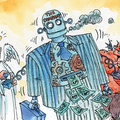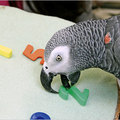
At the Frankfurt Motor Show, a CEO, made by Shuanghuan Automobile. BMW says the car is a copy of its X5 S.U.V.
FRANKFURT, Sept. 11 — It’s hardly surprising that a car that bills itself as the “ultimate driving machine” would inspire imitation. But to BMW, the CEO, a Chinese sport utility vehicle, is less respectful homage than brazen knockoff.
Charging that the CEO is a copy of BMW’s popular X5, the company has filed suit to prohibit its sale in Germany by the Chinese carmaker Shuanghuan Automobile.
That did not prevent Shuanghuan’s European importer from showing off the CEO on Tuesday at the Frankfurt Motor Show.
It was a vivid illustration, on the show’s first day, that the struggle over intellectual property rights between China and the West — a battle that has ranged over products from designer handbags to computer chips — now extends to cars.
“We did not like it,” BMW chief executive, Norbert Reithofer, said curtly in an interview here.
Neither did DaimlerChrysler, which is taking legal action against Shuanghuan to prevent it from selling the Noble, a subcompact that bears an uncanny resemblance to Daimler’s Smart minicar. The Noble did not appear at the show, though the importer, China Automobile Deutschland, insisted that it decided on its own not to distribute the car in Germany.
“Naturally, our cars are inspired by European carmakers,” said Karl Schlössl, a German who is the chief executive of China Automobile. “But we reject the charge that they are copies.”
Mr. Schlössl seemed to be reveling in the dispute, which catapulted his Chinese client from obscurity to center stage at this car show, traditionally dominated by the titans of German automaking.
At a circuslike news conference, Mr. Schlössl refused to speak the name BMW, instead referring to it as “that company.” He spoke of having a southern German accent that would make him at home in the hallways of the Munich-based BMW, and he introduced a tall blond woman as his companion.
Mr. Schlössl said Shuanghuan, which is based in Shijiazhuang, China, and has been producing cars since 1988, had approval from the Chinese government to make these models. But he said there was no one from the company available to answer additional questions.
There are serious issues behind all the theatrics. Few European executives doubt the Chinese will be genuine competitors in a few years, despite a bumpy start because of safety concerns with their first models. Brilliance JinBei Automobile, a Chinese carmaker with a more established reputation overseas than Shuanghuan, is drawing attention with its new compact car.
With the web of alliances between Chinese and Western automakers, there are plenty of opportunities for European innovations to turn up in Chinese cars that are then peddled to Europeans.
General Motors and Honda have both accused Chinese carmakers of copying their designs, often slavishly, but have gotten little relief from Chinese courts. Some auto analysts said the European manufacturers needed to accept copying as the price of doing business in China.
“There are three copies of the Smart,” said Graeme Maxton, an independent auto analyst in Hong Kong. “When it comes to body panels, I almost sympathize with the Chinese; it’s not that big a deal.”
Mr. Maxton said Chinese carmakers sometimes copied the exterior of a car from one model, and the interior from another. In the case of the CEO, for instance, it is not clear that the BMW X5 was the sole inspiration for its design. Auto critics have said that while the rear end of the vehicle is a dead ringer for the X5, the front end looks more like a Toyota Land Cruiser.
BMW emphasized that under the hood, the CEO is no X5. Small wonder: the X5 starts at 59,000 euros ($86,830) in Europe; the twin-turbo diesel model on display here goes for 92,000 euros ($126,040). Mr. Schlössl said the CEO would sell for a base price of 25,900 euros ($35,483).
“Someone who buys a BMW for 100,000 euros is not the same person who will look at a CEO,” Mr. Schlössl said.
Regardless, the Germans are zealous about protecting their image, particularly at a car show on their home turf.
“I think it’s confusing to our customer base,” said DaimlerChrysler’s chairman, Dieter Zetsche. “Showing a vehicle that looks very similar to a car on our stand raises unnecessary questions.” Mr. Zetsche said he would consider litigation against other Chinese knockoffs.
DaimlerChrysler and BMW have manufacturing operations in China, as well as thriving export franchises, and neither seemed keen on turning the dispute into a broader offensive against China.
Mr. Zetsche and Mr. Reithofer said they believed that the Chinese government would protect intellectual property more scrupulously as their own engineers begin turning out proprietary technology.
“In Asia, in general,” Mr. Zetsche said, “the culture does not define copying as something bad or unethical.”
For now, the Chinese are struggling with more basic issues, like designing a safe car. Two carmakers, Brilliance and Landwind, suffered when their cars performed abysmally in crash tests conducted by the German automobile club ADAC.
Landwind has stopped selling while it retools its cars to improve their safety, according to Peter Bijvelds, a Dutch car dealer who holds the distribution license for the brand.
Brilliance, which collaborates with BMW in assembling cars in China, insisted it had improved its safety standards, though it still received only a middling score in a subsequent crash test. It presented its new compact, the BS2, as a low-cost alternative to the Volkswagen Golf.
Like Mr. Zetsche and Mr. Reithofer, the vice chairman of Brilliance, He Guohua, said he, too, was confident China would regulate intellectual property more strictly in coming years.
In any event, he declared, his cars, which were styled with the help of an Italian design studio, do not rip off any of their European rivals.
“We do our own design work,” Mr. He said.





